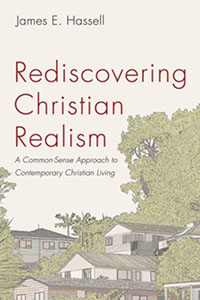Rediscovering Christian Realism: A Common-Sense Approach to Contemporary Christian Living
By James Haskell (Resource Publications)
Polarization isn’t just political; it’s religious, too. James Hassell, pastor of Westoak Woods Baptist Church in Austin, seeks a way past this division and toward bold Christian living in the church and the world. His proposed solution is to elevate Christian Realism.
 Hassell introduces Christian Realism by defining reality as “what is,” contrary to Rene Descartes and Immanuel Kant, both of whose influential philosophies developed out of profound suspicion of reality. Hassell also differentiates between legalistic and relativistic branches of American Christianity, placing Southern conservatives in the former and Northern liberals in the latter.
Hassell introduces Christian Realism by defining reality as “what is,” contrary to Rene Descartes and Immanuel Kant, both of whose influential philosophies developed out of profound suspicion of reality. Hassell also differentiates between legalistic and relativistic branches of American Christianity, placing Southern conservatives in the former and Northern liberals in the latter.
Breaking free of this polarization may require a reorientation, Hassell contends. Reorientation is a two-phase process. The first phase is to reject henotheism, or what might be likened to an open marriage with God. The second phase involves “The Four Rs:” God’s revelation to us, relationships with unbelievers, the most responsible action in keeping with the commands to love God and love others, and a “robust Kingdom understanding”—seeking first the realm of God’s reign.
The remainder of the book suggests a rubric for putting the two phases into action, extracting oneself from the either/or polarity of legalism and humanism. Here, Hassell calls for a both/and, two-step “balanced approach” based on being in the world and also not of it.
Step one of the balanced approach involves humility, or coming to terms with one’s sin and limitations, as well as the necessity of God’s grace. Hassell leans on Reinhold Niebuhr and Emil Brunner for this discussion. The explanation of step two—removing oneself from conservative and liberal camps—comes off as theoretical, in large part because Hassell’s argument relies on Peter Berger, Paul Tillich, Neibuhr and Leslie Newbigin.
The theoretical nature of the argument is mitigated to some extent by the closing chapter, in which Hassell suggests how to enact the balanced approach, with focus on the local church. For those disenchanted with both legalist and humanist churches’ tendency to bend to culture, Hassell gives much to think about in differentiating them from a Christian Realist stance.
Hassell contends “Christian Realism is one of the most viable solutions” for overcoming the cultural divide between idealism and nihilism. Christian Realism is predicated on what H. Richard Niebuhr termed “radical monotheism”—complete loyalty to God and nothing else. Becoming a radical monotheist, however, is not for the faint of heart.
Rediscovering Christian Realism, though very short, is not a book for casual readers. Hassell’s explanation of “common sense” relies on the technical arguments of intellectuals not likely to show up on the average person’s reading list. His argument requires readers to have some background in fields the average person and quite a few pastors do not have. Even so, Hassell offers much food for thought.
Eric Black, executive director/publisher/editor
Baptist Standard
















We seek to connect God’s story and God’s people around the world. To learn more about God’s story, click here.
Send comments and feedback to Eric Black, our editor. For comments to be published, please specify “letter to the editor.” Maximum length for publication is 300 words.